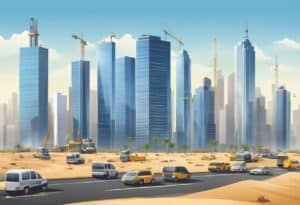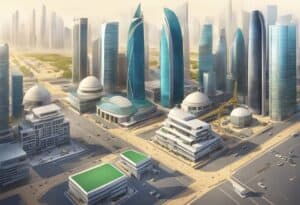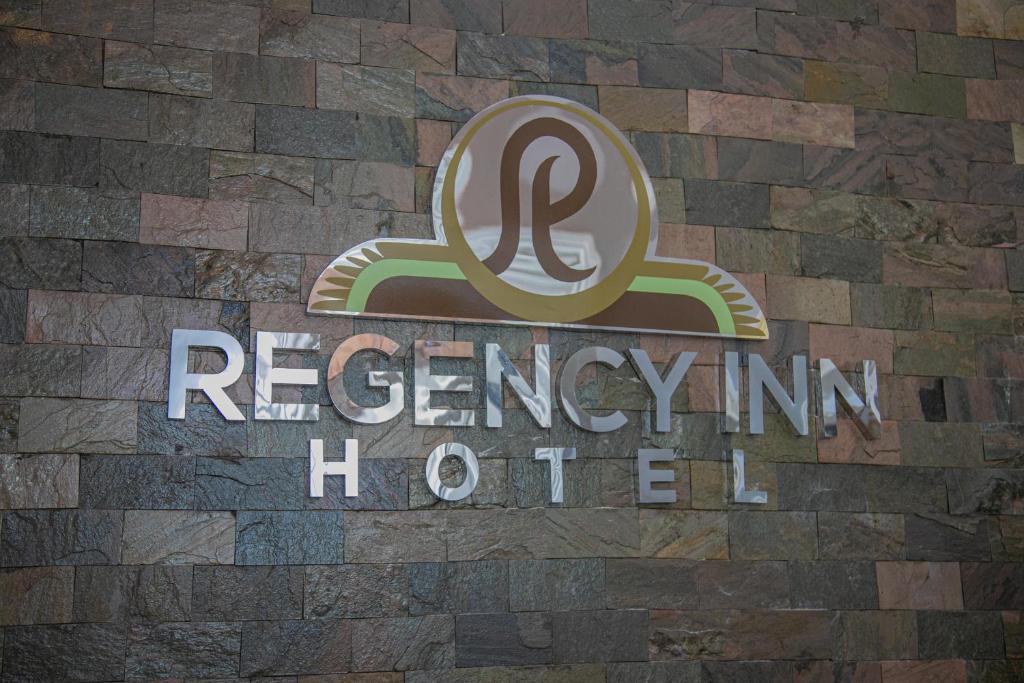Real estate is a significant contributor to Qatar’s economy, and its growth potential has been a topic of discussion for some time. The country’s real estate market has been on an upward trajectory in recent years, with a growing number of investors attracted by the opportunities available. But is real estate booming in Qatar?
The answer is yes. Qatar’s real estate market is currently booming, with a range of factors contributing to its growth. One of the main drivers is the government’s investment in infrastructure, which has led to an increase in demand for housing and commercial properties. Additionally, the country’s growing population and expanding economy have created a need for more properties, both for residential and commercial purposes.
There are several opportunities available in Qatar’s real estate market, including the development of new properties and the renovation of existing ones. Investors can also take advantage of the country’s favorable tax policies and its strategic location, which makes it an attractive destination for businesses. Overall, the real estate market in Qatar is poised for continued growth, making it an attractive option for investors looking to enter the market.
State of the Real Estate Market
Qatar’s real estate market has been experiencing a steady growth in recent years, with the industry playing a crucial role in the country’s economic development. The following subsections provide insights on the economic impact of FIFA World Cup, post-Covid-19 recovery, and trends in residential and commercial spaces.
Economic Impact of FIFA World Cup
The FIFA World Cup 2022 is a significant driver of growth for Qatar’s real estate market. The government’s commitment to attracting international events to the country has resulted in high demand for residential and commercial spaces. The event has also led to significant investments in infrastructure, including the development of new stadiums, hotels, and transportation systems. These investments have created a ripple effect, leading to a surge in demand for residential and commercial spaces.

Post-Covid-19 Recovery
The Covid-19 pandemic has had a significant impact on the global economy, including the real estate market in Qatar. However, the country has shown resilience in its post-Covid-19 recovery, with the real estate market bouncing back faster than expected. The Qatari government’s swift response to the pandemic, including the implementation of strict health and safety protocols, has helped to restore investor confidence. The market has seen a rise in demand for residential and commercial spaces, as well as investment opportunities.
Trends in Residential and Commercial Spaces
The real estate market in Qatar is witnessing a shift in demand from traditional office spaces to more flexible and collaborative workspaces. The rise of remote work and the need for more flexible office spaces have led to an increased demand for co-working spaces and serviced offices. The residential real estate market has also seen a surge in demand for affordable housing, with developers focusing on building smaller, more affordable homes. Additionally, there has been a growing trend of incorporating sustainability into real estate development plans, with a focus on renewable energy and reducing carbon footprint.
Overall, the real estate market in Qatar is booming, with high demand and rising transactions in both residential and commercial spaces. The growth is attributed to various factors, including the economic impact of FIFA World Cup, post-Covid-19 recovery, and the trend towards more sustainable and flexible real estate development plans.
Investment Landscape
Qatar’s real estate market has been experiencing steady growth in recent years, attracting both domestic and foreign investors. This section will explore the investment landscape in Qatar’s real estate market, including foreign investment and ownership laws, investor profiles and interests, and Real Estate Investment Trusts (REITs).
Foreign Investment and Ownership Laws
Foreign investors are allowed to own real estate properties in Qatar. However, foreign ownership of land is limited to specific areas designated by the government. Additionally, foreign investors are required to obtain approval from the Ministry of Justice to purchase real estate properties in the country. The approval process is straightforward and can be completed within a few days.
Investor Profiles and Interests
Qatar’s real estate market attracts a diverse range of investors, including high net worth individuals, institutional investors, and real estate investment trusts (REITs). High net worth individuals tend to invest in luxury residential properties, while institutional investors focus on commercial properties such as office buildings and shopping centers. REITs are also becoming increasingly popular in Qatar’s real estate market, providing investors with an opportunity to invest in a diversified real estate portfolio.
Real Estate Investment Trusts (REITs)
REITs are investment vehicles that allow investors to pool their money and invest in a diversified portfolio of real estate assets. REITs are required to distribute a significant portion of their income to investors in the form of dividends, making them an attractive investment option for income-seeking investors. Qatar’s real estate market has seen the emergence of several REITs in recent years, providing investors with an opportunity to invest in a diversified real estate portfolio.
In conclusion, Qatar’s real estate market is experiencing steady growth, attracting both domestic and foreign investors. Foreign investors are allowed to own real estate properties in Qatar, and the approval process is straightforward. Qatar’s real estate market attracts a diverse range of investors, including high net worth individuals, institutional investors, and REITs. REITs are becoming increasingly popular in Qatar’s real estate market, providing investors with an opportunity to invest in a diversified real estate portfolio.
Development and Infrastructure
Qatar has been investing heavily in infrastructure development, which has been a key driver of the country’s real estate boom. The government has been actively involved in promoting the development of various projects that have led to urban expansion and the creation of new communities.
Major Projects and Urban Expansion
Lusail City and The Pearl are two of the most prominent examples of urban expansion in Qatar. Lusail City is a massive development project that aims to create a new city from scratch, complete with residential, commercial, and entertainment facilities. The Pearl, on the other hand, is a man-made island that is home to some of the most luxurious residential properties in the country.
Msheireb Downtown is another major project that aims to create a sustainable and environmentally friendly community in the heart of Doha. The project incorporates green spaces, renewable energy sources, and smart technologies to create a modern and sustainable urban environment.
Transportation and Connectivity
Qatar has also been investing in transportation networks to improve connectivity and accessibility. The Doha Metro is one of the most significant infrastructure projects in the country, providing a fast and efficient mode of transportation for residents and visitors alike. The metro system is set to expand further, with new lines and stations planned for the future.
Qatar’s road network has also been improving, with several major highways and bridges constructed in recent years. The country’s international airport, Hamad International Airport, is one of the busiest in the region and serves as a major hub for air travel.
Overall, Qatar’s focus on development and infrastructure has been a key driver of the country’s real estate boom. The government’s investments in major projects and transportation networks have created new opportunities for developers and investors alike, leading to the creation of new communities and the expansion of existing ones.
Economic and Demographic Factors
Qatar’s real estate industry is a cornerstone of economic expansion, reflecting the nation’s progress and shaping its future. The sector’s adaptability underscores Qatar’s commitment to progress, seamlessly blending tradition with modernity for comprehensive national growth.
Population Growth and Urbanization
Qatar’s population has been growing rapidly over the past decade, with an annual growth rate of around 4%. This growth has been driven by a combination of factors, including a stable political environment, a strong Qatari economy, and a high standard of living. As a result, there has been a significant increase in demand for housing and commercial real estate in the country.
Urbanization has also been a key driver of growth in the real estate sector. Qatar’s urban population has been growing at an even faster rate than the overall population, with many people moving to the cities in search of better job opportunities and a higher standard of living. This trend is expected to continue in the coming years, further driving demand for real estate in urban areas.
Economic Diversification and Stability
Qatar’s economy has traditionally been heavily reliant on the oil and gas sector, which has been a major driver of growth in the real estate industry. However, the government has been working to diversify the economy in recent years, with a particular focus on developing the non-oil sectors.
This economic diversification has helped to create a more stable and sustainable economy, which in turn has had a positive impact on the real estate sector. The country’s GDP has been growing steadily in recent years, and is expected to continue to do so in the coming years.
Overall, the combination of population growth, urbanization, economic diversification, and a stable political environment has created a favorable environment for real estate in Qatar. As a result, the industry is expected to continue to grow and thrive in the coming years.
Market Dynamics
Supply and Demand Balances
The real estate sector in Qatar has been experiencing a boom in recent years, with the market showing signs of recovery after a period of uncertainty. The supply of residential units, houses, and villas has increased significantly in recent years, and the demand for these properties has also grown. According to recent reports, the size of the residential real estate market in Qatar is expected to grow at a CAGR of over 6.24% during the forecast period.
The demand for residential buildings in Qatar has been driven by a growing population, increasing urbanization, and a rise in disposable income. The government’s focus on affordable housing has also contributed to the growth in demand. However, the supply of affordable housing remains a challenge, with many residential projects delayed or canceled due to COVID-19.
Property Types and Preferences
Property types and preferences in Qatar vary by location, budget, and lifestyle. The most popular property types in Qatar are apartments and villas, with apartments being the most affordable option. Villas are preferred by families and those seeking more space and privacy.
In recent years, there has been a growing interest in high-end luxury properties, with many developers focusing on luxury apartments and villas. However, the demand for affordable housing remains high, and the government has been taking steps to address this issue by launching affordable housing projects.
Overall, the real estate market in Qatar is experiencing a period of growth, with the demand for residential properties increasing. The supply of affordable housing remains a challenge, but the government’s commitment to attracting international events to the country is expected to drive further growth in the sector.
Sustainability and Innovation
Qatar’s real estate industry is experiencing a boom, and with it comes a growing focus on sustainability and innovation. The industry’s commitment to green buildings and ESG compliance is paving the way for a more resilient future, while technological advancements are transforming the way real estate is bought, sold, and managed.
Green Buildings and ESG Compliance
Qatar’s real estate sector is on track to reduce its carbon footprint and pave the way for a greener future for the country. Major projects such as the Doha Metro, Msheireb Downtown, and Lusail City have incorporated Qatar’s sustainability agenda into the core of their development plans, as evidenced by their emphasis on renewable energy. These buildings are designed to be more energy-efficient, with features such as solar panels and green roofs.
Moreover, Qatar’s real estate industry is increasingly focused on ESG (Environmental, Social, and Governance) compliance. This heightened visibility can translate into greater interest from international investors looking to capitalize on Qatar’s growing reputation as a hub for sustainability and innovation.
Technological Advancements in Real Estate
Technological advancements are transforming the way real estate is bought, sold, and managed in Qatar. The industry is embracing digital innovation to improve efficiency, reduce costs, and enhance the customer experience. For example, virtual reality technology is being used to create immersive experiences for potential buyers, allowing them to “walk through” a property without ever leaving their home.
Additionally, blockchain technology is being used to streamline the real estate transaction process, reducing the time and cost associated with buying and selling property. This technology allows for secure, transparent, and tamper-proof transactions, which can help to build trust between buyers and sellers.
In conclusion, Qatar’s real estate industry is experiencing a boom, with a growing focus on sustainability and innovation. The industry’s commitment to green buildings and ESG compliance is paving the way for a more resilient future, while technological advancements are transforming the way real estate is bought, sold, and managed.
Regulatory and Legal Framework
Real estate laws and governance play a crucial role in shaping the real estate market in Qatar. The Ministry of Justice is responsible for drafting and implementing the laws and regulations concerning the real estate sector. This section discusses the ownership regulations for foreigners and the real estate laws and governance in Qatar.
Ownership Regulations for Foreigners
Foreigners are allowed to buy and own real estate in Qatar, subject to certain restrictions. They can purchase residential and commercial properties in designated areas, such as The Pearl and West Bay Lagoon. However, they cannot own property in other areas without special permission from the Ministry of Interior. Foreigners can also own land for a period of 99 years, subject to renewal.
Real Estate Laws and Governance
The real estate sector in Qatar is governed by several laws and regulations, including the Real Estate Development Law, the Real Estate Brokerage Law, and the Real Estate Registration Law. The Real Estate Regulatory Authority (RERA) is responsible for regulating the real estate sector and ensuring compliance with the laws and regulations.
The Law regulates the development of real estate projects, including the licensing requirements for developers and the procedures for obtaining permits. The Real Estate Brokerage Law regulates the activities of real estate brokers and sets out the requirements for obtaining a license. The Real Estate Registration Law requires all real estate transactions to be registered with the Ministry of Justice.
In conclusion, the regulatory and legal framework in Qatar provides a stable and transparent environment for real estate investment. The laws and regulations are designed to protect the interests of both buyers and sellers and ensure that the real estate market operates in a fair and efficient manner.

Future Outlook
Market Forecasts and Predictions
Qatar’s real estate market is expected to continue its upward trajectory in the near future. According to Statista Market Forecast, the market is projected to grow by 2.43% from 2024 to 2028, resulting in a market volume of US$534.60bn in 2028. This growth is driven by strategic national initiatives and positive market trends, such as the incorporation of Qatar’s sustainability agenda into the core of development plans.
Additionally, there is a growing interest in commercial real estate, particularly in the hospitality sector. Investors are developing and establishing hotels and different hotel apartments across the country, which is driving the growth of the real estate market.
Impact of National Vision 2030
The National Vision 2030 is a strategic plan that aims to transform Qatar into a modern, diversified, and sustainable economy. The plan includes initiatives to develop infrastructure, attract foreign investment, and promote economic activity. The real estate market is expected to benefit significantly from these initiatives, as they will create demand for new developments and attract more investors to the country.
In line with the National Vision 2030, Qatar’s real estate industry is on track to reduce its carbon footprint and pave the way for a greener future for the country. Three of the country’s most recent major projects, the Doha Metro, Msheireb Downtown, and Lusail City, have incorporated Qatar’s sustainability agenda into the core of their development plans, as evidenced by their emphasis on renewable energy.
In conclusion, Qatar’s real estate market is expected to continue its growth trajectory in the near future, driven by strategic national initiatives and positive market trends. The National Vision 2030 will also have a significant impact on the market, creating demand for new developments and attracting more investors to the country.
Qatar MLS
Stay ahead of the curve and gain a competitive edge in Qatar’s fast-paced real estate market with Qatar MLS‘s cutting-edge solutions.

Frequently Asked Questions
What are the current trends in the Qatar real estate market?
- The real estate industry in Qatar has been growing at an unprecedented rate, attracting local and foreign investors to invest in the sector.
- One of the factors contributing to the growth of the real estate housing market in Qatar is the government’s effort to diversify the economy.
- The country’s economic stability, booming tourism industry, and increased foreign investments have contributed to the development of the real estate sector.
- Qatar’s Real Estate industry is on track to reduce its carbon footprint and pave the way for a greener future for the country.
How has the Qatar real estate price index changed recently?
- COVID-19 has negatively impacted the Qatari residential real estate market. Many residential projects were delayed or canceled due to COVID-19.
- The size of Qatar residential real estate market is USD 4.28 billion in the current year and is anticipated to register a CAGR of over 6.24% during the forecast period.
- As more people move to Qatar for work or to live, the demand for housing continues to increase. This has led to a surge in construction activity, with many new apartment buildings and residential communities being built to meet the demand.
What are the projections for the future of real estate in Qatar?
- The country’s strategic location, investment-friendly policies, and ambitious development plans provide ample opportunities for real estate developers to build sustainable and innovative projects that meet the growing demand.
- Qatar’s Booming Real Estate Market is expected to continue to grow in the coming years, with the government’s focus on diversifying the economy and attracting foreign investments.
What is the average return on investment for Qatar real estate?
- The average return on investment for Qatar real estate varies depending on the type of property and location. However, the rental yields in Qatar are considered to be among the highest in the world.
How is the demand for property in Qatar affecting the real estate market?
- The demand for property in Qatar is driving the real estate market, with many new apartment buildings and residential communities being built to meet the demand.
- The increase in demand has also led to a surge in construction activity, creating new job opportunities and contributing to the growth of the economy.
What are the benefits and risks of investing in Qatar’s real estate?
- Benefits of investing in Qatar’s real estate include high rental yields, a growing economy, and a stable political environment.
- Risks include fluctuations in the global economy, changes in government policies, and the possibility of oversupply in the market.












